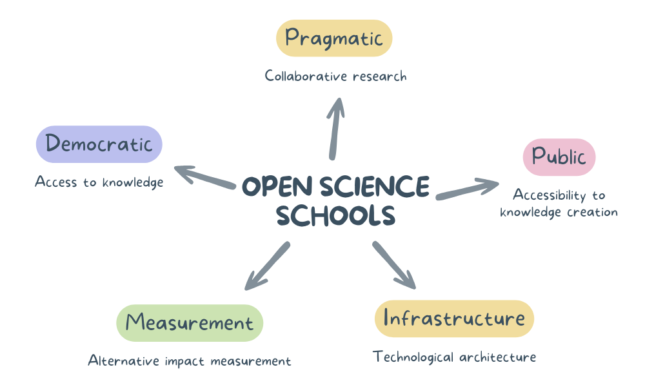Walking the talk: a peek into Open Science practices at CWTS
At CWTS, Open Science is a prominent topic, but what do we actually do about it? Ana Parrón Cabañero, PhD candidate at CWTS, interviewed colleagues and explored the integration of Open Science into mission and practice at the institute. Here, she reflects on her findings and links them to theory.
Open Science at CWTS in retrospect
Leiden University sees Open Science (OS) as a key element on the path towards making greater scientific and societal impact and fostering research quality and integrity. OS is encouraged across the university and, to ensure that the transition is based on evidence, the Open Science Lab (stay tuned to learn more about it soon!) has been established at the Centre for Science and Technology Studies (CWTS).
Almost three years ago, the former director of CWTS Sarah de Rijcke wrote a blog post discussing the changes taking place at CWTS and introducing the – then under development – value-based strategy. In this strategy, the CWTS Knowledge Agenda 2023 – 2028, OS holds a central position. Most importantly, the knowledge agenda is guided by some of the values that underpin the OS movement, like transparency, responsibility, and collaboration. In line with these developments, in September 2021, we became the first centre at Leiden University to have its own Open Science policy. The value that OS has for CWTS is reflected in our mission as well: ”we aim to contribute to the adoption of OS practices”. Following from “practicing what we preach”, this also means that not only do we study OS, but commit to open research practices ourselves.
But… what has been happening on the work floor? To take a glimpse into whether and how we are practising what we preach when it comes to OS, I had separate conversations with five of my colleagues.
The different flavours of Open Science
The broadness of OS has been recognised: the aspects it encompasses are manifold, but so are the variety of goals and motivations underpinning openness in research practices. A glimpse into CWTS allows us to observe a microcosm representing such variety. In an attempt to consolidate the diverse perspectives of my colleagues, I use the five OS schools of thought as devised by Fecher & Friesike (2014) to structure the insights from the interviews (Figure 1).
Some colleagues displayed an orientation towards a combination of public and democratic motivations, as our conversations centred around the need for transparency, engagement, quadruple helix collaboration, and inclusiveness (well reflected in this quote: “how are they [people who are doing research] thinking about who to include or who to reach with their material?”). They emphasised knowledge co-creation and a broader definition of “access” in open access, while also highlighting the need for a case-by-case decision on how and why to be open. Other colleagues put efficiency at the centre, sharing views that align more with pragmatic motivations. Open data and open code were the main topics in these conversations, but also the idea of openness resulting in collective benefit and a wider dissemination of research outputs. Citing one of my colleagues, “[being open] helps spreading knowledge, it helps other people getting new ideas”. The infrastructure perspective was also present across the interviews, with a particular focus on the challenges for qualitative researchers to store their data. Some of the concerns around infrastructure are well reflected in this quote from one of the interviews: “there are big questions about what are these different data cultures? And how do they relate or not to existing infrastructure? And can we build new infrastructure that speaks more to specific research communities?”. Finally, while measurement, and particularly alternative metrics to evaluate research, is an area of study at CWTS, this motivation did not emerge during my conversations with colleagues. In short, there is interest in both the technicalities of OS and the culture that it promotes, with some colleagues in a middle ground and others showing a stronger inclination towards one or the other.

As open as possible: navigating the challenges
The first practice that popped up in conversations was open access publishing, the one that most scholars at CWTS are very familiar with. According to our OS policy, it is mandatory to make articles openly accessible via open access journals or depositing in a repository. Regarding open access publishing, concerns were expressed about expensive article processing charges (APCs). Our community is well acquainted with preprints and has experience with posting them, but it was conveyed that submitting a preprint with collaborators requires dialogue to ensure that everyone is supportive of the action. Additionally, there is awareness around open peer review, but it seems to be far from becoming the norm.
Open data and the FAIR (Findable, Accessible, Interoperable, Reusable) principles came up in all conversations, often discussed side by side. While they are well understood, the practical application of these principles is not straightforward. This is partly due to the fact that making datasets open and useful for others requires considerable effort. When it comes to Citizen Science involving non-academic collaborators who also collect data, structuring datasets can become even trickier because of the higher heterogeneity. To this, it can be said that our OS policy acknowledges this issue and does not mandate data openness when it would require excessive effort. On top of this, reusing existing open data is also seen as challenging, often requiring a substantial time investment. In this sense, it was hinted that openly sharing and carefully documenting research methods together with the data would make them more useful (and reusable!).
For researchers who work with code at CWTS, openly sharing code is common practice. While sharing it demands certain commitment, it seems that over time they have incorporated this practice as the norm. In cases where they feel their code is not good or useful enough, they tend to keep it closed. In addition, open code shared by others is regularly used by our scholars.
Citizen Science is practiced through projects like CitiObs within the Citizen Science Lab. While colleagues at CWTS are aware of Citizen Science, it does not appear to be practiced widely beyond that. This can be due to the nature of the larger part of the research undertaken here. However, there are good reasons to bring citizens to one’s research, and as our colleague stated, involving citizens from the start is key, especially if you want to have policy decisions change, since they are the ones affected by it.
Driving change: the role of CWTS in Open Science
How can we at CWTS contribute to OS beyond our boundaries? My colleagues highlighted our existing expertise in research evaluation, which might be used for assessing the impact and consequences of OS practices and policies on research. In addition, because of the various international networks that we are part of, we would be well positioned to engage in advocacy efforts to promote OS. It was also suggested that, as a renowned centre, we should lead by example, which brings us back to the start and to one of our important guiding principles: “We strive to practice what we preach”. My colleagues at CWTS, driven by the will to enhance research quality and to have a wider scientific and societal impact, seem to be keenly interested in continuing to learn and uptake OS practices. We particularly appreciate the opportunity to learn about OS by engaging in conversations with other people here. Rephrasing one of my colleagues, to have a good OS culture you need to have a good culture as a foundation. This goes beyond mere infrastructure or research outputs; embracing openness and transparency is about fostering open communication. As our policy recognises, OS takes time, but CWTS is positioned to be moving in the right direction.
New to Open Science? Here is a piece of advice from my colleagues at CWTS:
- Read Sabina Leonelli’s Philosophy of Open Science.
- Read the UNESCO Recommendation on Open Science.
- Join your Open Science Community. Become a member of the Leiden community here.
- Install the Unpaywall extension on your browser.
- Post your first preprint (check out this article by Ludo Waltman).
- Contact your data steward or local librarian.
- Come chat with us at the Citizen Science Lab or the Open Science Lab (website coming soon) based at CWTS!



0 Comments
Add a comment